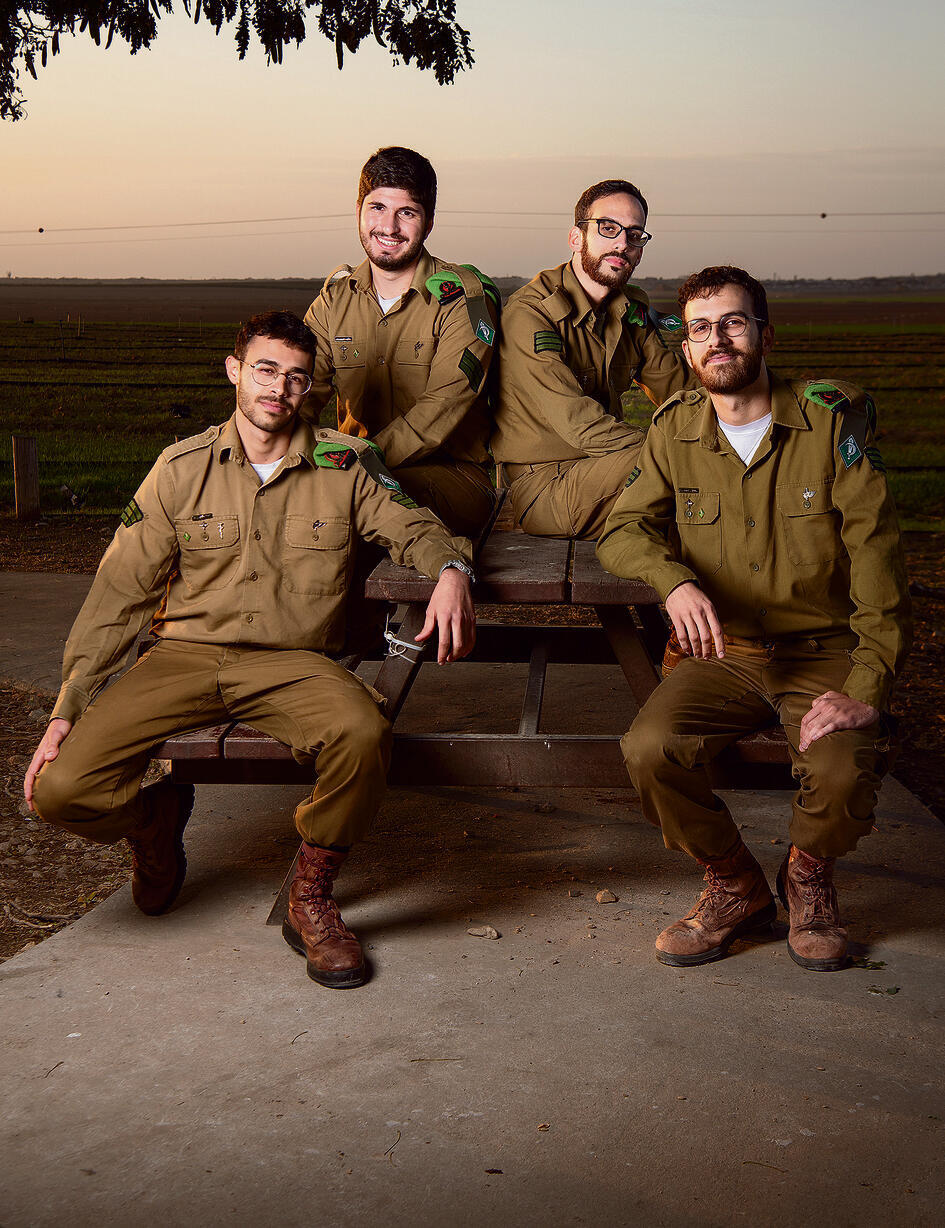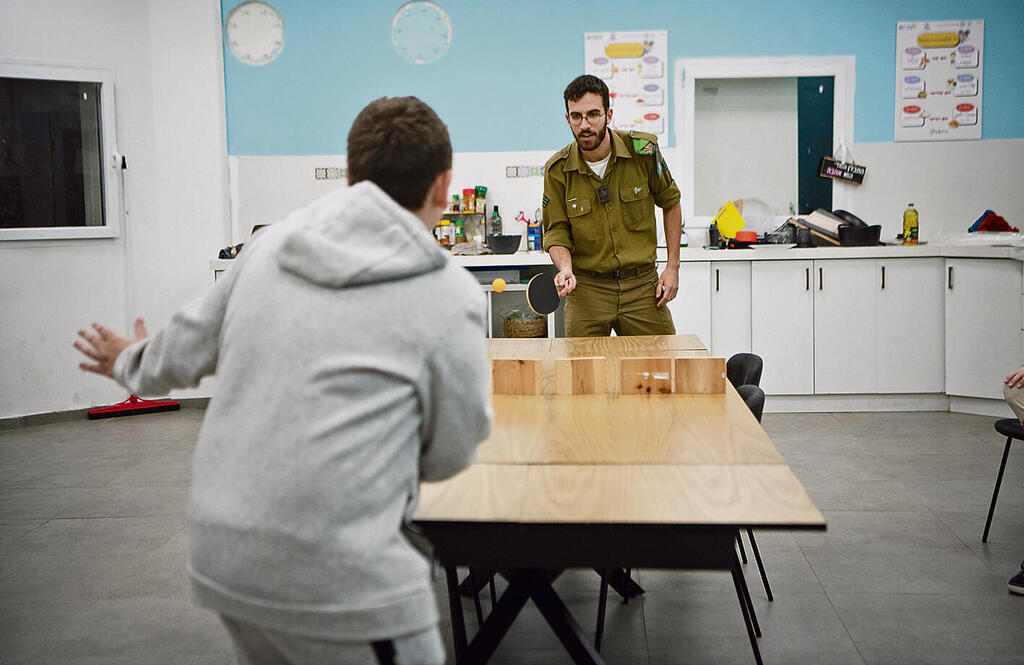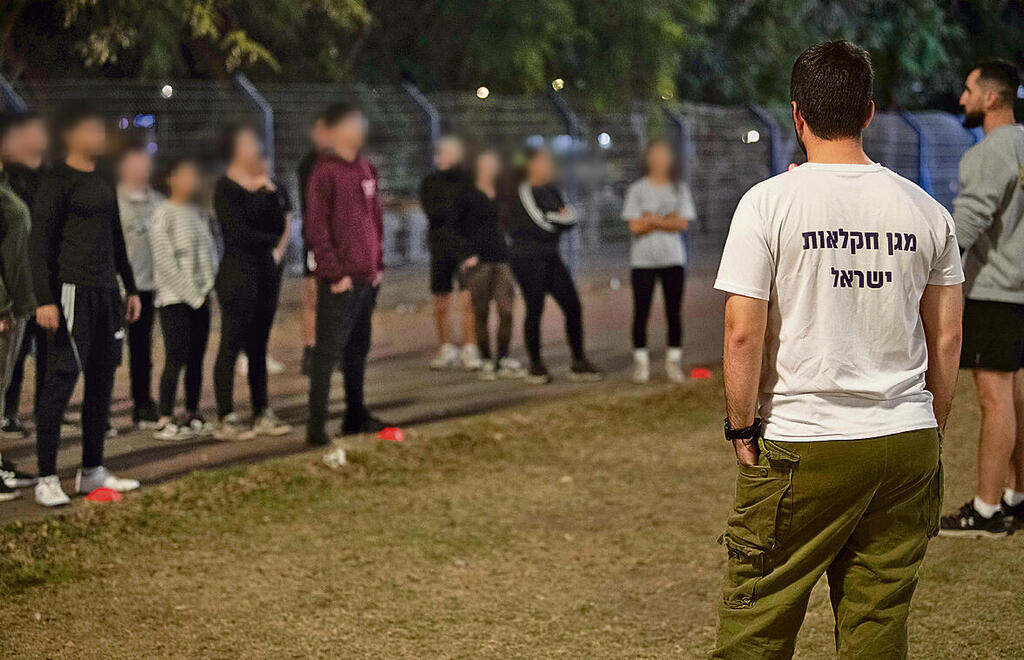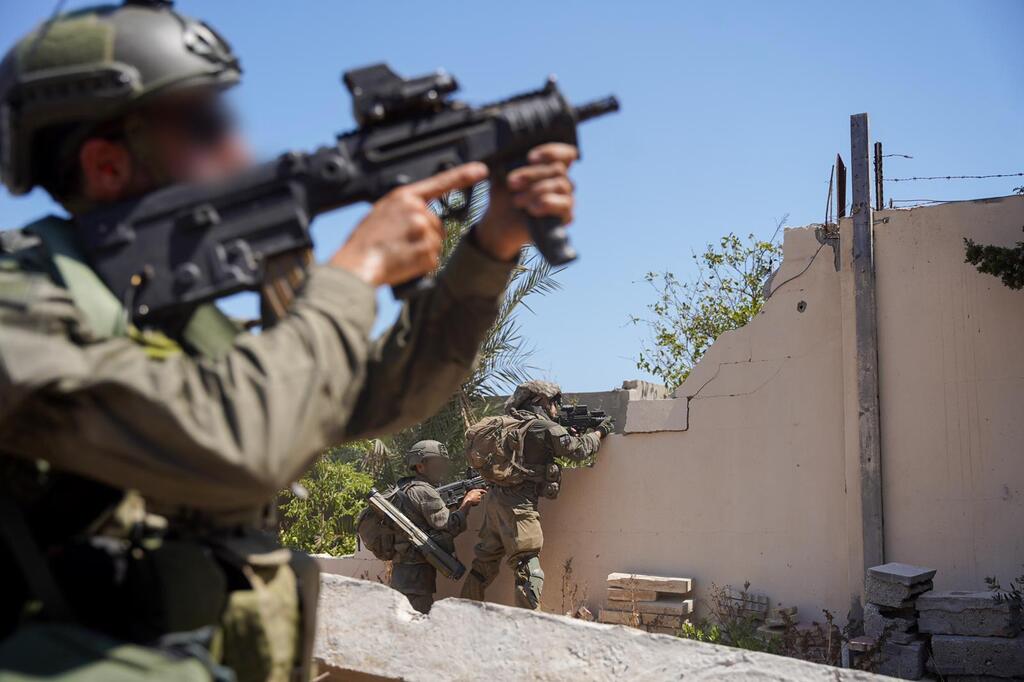The meeting takes place at the old water tower in Be'erot Yitzhak, about 1.2 miles from the 1950 armistice line, the border of the Gaza Strip. Now, they wear military uniforms with the insignia of the Education Corps, without their personal weapons, but still with the green berets of the Nahal Brigade.
Until recently, Itay (21), Shahar (22), Ofek (21), and Ori (23) were fighting inside Gaza. In recent months, they have transitioned to roles in education across the regional councils of Eshkol and Sdot Negev, in the city of Netivot, and in communities heavily impacted by the events of October 7.
The four are soldiers from the Nahal Brigade who now belong to the Education Corps. They are part of Garin (a group of youth from the same program) in the 50th Battalion, which makes up about a quarter of the battalion's combat soldiers. They volunteered for a year prior to their military service and are now engaging in an additional volunteer year near the end of their service, known as the "mission phase."
The group of soldiers currently in the mission phase—including Itay, Shahar, Ofek, and Ori—finds themselves closing an emotional circle as their volunteer efforts are taking place in the Gaza border region. Their mission in the Education Corps includes, among other things, encouraging youth to join meaningful combat service, helping rehabilitate the area, and strengthening resilience and morale in Israel's western Negev region.
"We're without weapons now, and in the end, that's the swagger of being a combat soldier," says Staff Sergeant Ori Navon (23). "Suddenly, I look like a desk job soldier, but that doesn't mean the mission we're doing now is any less important."
Ori, previously a combat soldier in the infantry company of 50th Battalion, is now completing his mission phase in the Sdot Negev Regional Council, in the village of Yoshivia. "If I had entered the mission phase before the war," he adds, "it wouldn't have been the same as it is after what I experienced in Gaza. We need to help these communities rebuild. They've been through a lot of battles, things have been burned. Now there's a need for education because many students were evacuated and haven't been in school for a long time."
Staff Sergeant Ofek Cohen from Ashdod says, "There's something very emotional about having fought here and now rebuilding homes." Cohen, also a former combat soldier in the 50th Battalion's operational company, is now working with youth in the Eshkol Regional Council. "We were the barrier between the terrorists and the residents here, and now we're working with them," he shares. "We're rebuilding homes and mentoring kids. For some people, the concept of soldiers in the Education Corps is a bit strange, but they're starting to understand it.
"There's nothing more meaningful than being a combat soldier. That's what has to be done," Cohen adds. "But we truly have the privilege of coming from that background as educators—to help affected communities. In the end, I stand in front of them and explain what combat is. I was as combat as it gets. I experienced war."
"It's a drastic change to suddenly become a teacher"
The four soldiers fought in Gaza from the very beginning of the war. They were in the thick of the battles and even lost comrades, including Ido Epel, Ori Bar-Or, and Amir Galilov. Staff Sergeant Shahar Dekel from Nof HaGalil and Staff Sergeant Itay Kanfo from Tzur Hadassah served together in the operational company of the 50th Battalion. Now, they live together in Netivot, working with students in schools and after-school programs, and conducting fitness training with teenagers.
Early in the war, on the third day of the maneuver into Gaza, Shahar and Itay faced a traumatic event. "We were advancing towards Shati," recalls Itay, a medic. "We crossed an open kill zone, and there was a tank providing cover for us. It was hit by an anti-tank missile, and we saw it burn. A wounded soldier was brought to us, and I treated him. I surprised myself with how calm I was and how I managed to function. I told him to focus on me and not on his injury until we connected with the medical team. In the end, I was satisfied with how I performed. In an instant, you're in a movie."
Shahar shares, "Everything felt normal to us, like training. The training prepared me really well. It's a drastic change to suddenly become a teacher."
Ori, also a combat medic, recalls the incident in which he lost three comrades from his company in Rafah. "It was in May, a mass casualty event," he recounts. "The battalion took over a school, and adjacent to it was a clinic with an explosive device that detonated. I treated the wounded, who were my friends in the company. Ido, Ori, and Amir, who were killed, were also close friends of mine."
"Education and combat go hand in hand"
The name of the Nahal Brigade is an acronym for "Fighting Pioneer Youth Framework." It has its roots in the early days of the state, with the establishment of Nahal groups. The 50th Battalion was previously a paratrooper battalion associated with the Paratroopers Brigade, where Shahar Dekel's grandfather also served.
"My grandfather told me he fought in the Six-Day War, Yom Kippur War, and Lebanon," he says. "And in the end, cumulatively, I fought more days than he did. Education and combat go hand in hand. If we don't educate, there won't be a state here. And if we don't fight, there also won't be a state here."
Itay adds, "Because of the war, this has more meaning. Experiencing war is something else; it's something our generation hasn't gone through. I tell the youth about it firsthand. It's historic that we got to be part of something so significant."
"This ain't no Fortnite"
There are a total of 220 soldiers from the Education Corps working in the Gaza border region. Twenty-eight of them are from the 50th Battalion, alongside fighters from the Caracal Battalion. IDF's Home Front Command decided on October 15 to take responsibility for the evacuees. Almost all its forces were deployed to the south to help establish educational systems in evacuated areas, as well as in the north.
In January, IDF decided to establish a unit called "Magal VeHerev" (Shield and Sword) to continue providing support in education, security, and settlement efforts, even as residents return to their homes.
Ofek: "I don't tell any student that being a combat soldier is easy. I present the difficulties. In the end, it has to be conveyed that if you become a combat soldier, you could get hurt."
Abraham (14), a student from Netivot, says, "Itay is a great guy. We play ping-pong and talk." When asked if he knows that Itay was a combat soldier, he looks surprised. "Wow," he says. "That takes courage to go in there. It's not a video game. This ain't no Fortnite. My dream is to join Unit Oketz (IDF K-9 Unit)."
Get the Ynetnews app on your smartphone: Google Play: https://bit.ly/4eJ37pE | Apple App Store: https://bit.ly/3ZL7iNv
Ofek: "They're surprised because suddenly a soldier without a weapon tells them he was a fighter. I'm the face they see behind what it means to be a combat soldier."
Shahar: "We have a student who's really in trouble with the police. We managed to sit with him for two hours and prepare him for his initial draft interview. At one point, I told him, 'Let's play ping-pong.' He told me, 'No, no, we need to prepare.' These are small moments."
Itay shares: "I had a kid who suddenly asked me to tell him what I did in the war. I started telling him, and he really wanted to know everything."
Do you have any doubts or dilemmas about whether you've done enough, and why you're now expected to educate as well?
Ofek: "The war is still ongoing, so we don’t have the right to take a break. Should I push the students? We all faced difficulties during the war, and I don’t tell any student that being a combat soldier is easy. I present the challenges. In the end, it has to be conveyed that if you’re a combat soldier, you can get hurt. You need both—education and combat. IDF has the ability to do both. I don’t know if there’s another army in the world that does this. Talking about these things is important."
Captain Yuval Mana, the platoon commander of the four, says during the conversation that the mantra given to the soldiers was, "Until now, you destroyed and dismantled infrastructure; now it's time to build. Until now, you were engaged in very different activities, and transitioning is definitely not easy. We are a country that needs to build as well. That is what you are doing."





